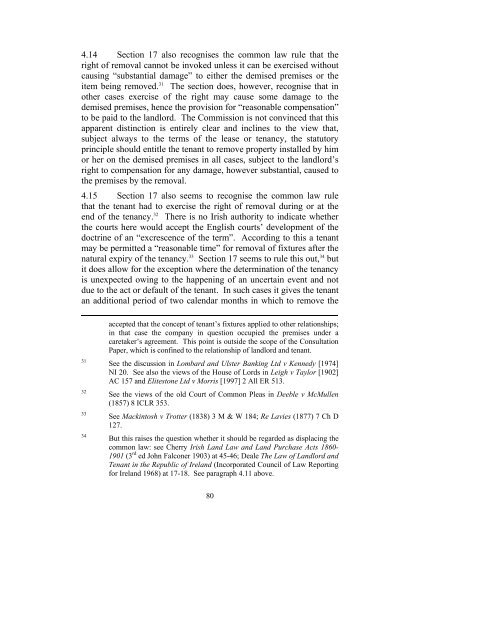Consultation Paper on the General Law of the Landlord and Tenant
Consultation Paper on the General Law of the Landlord and Tenant
Consultation Paper on the General Law of the Landlord and Tenant
Create successful ePaper yourself
Turn your PDF publications into a flip-book with our unique Google optimized e-Paper software.
4.14 Secti<strong>on</strong> 17 also recognises <strong>the</strong> comm<strong>on</strong> law rule that <strong>the</strong>right <strong>of</strong> removal cannot be invoked unless it can be exercised withoutcausing “substantial damage” to ei<strong>the</strong>r <strong>the</strong> demised premises or <strong>the</strong>item being removed. 31 The secti<strong>on</strong> does, however, recognise that ino<strong>the</strong>r cases exercise <strong>of</strong> <strong>the</strong> right may cause some damage to <strong>the</strong>demised premises, hence <strong>the</strong> provisi<strong>on</strong> for “reas<strong>on</strong>able compensati<strong>on</strong>”to be paid to <strong>the</strong> l<strong>and</strong>lord. The Commissi<strong>on</strong> is not c<strong>on</strong>vinced that thisapparent distincti<strong>on</strong> is entirely clear <strong>and</strong> inclines to <strong>the</strong> view that,subject always to <strong>the</strong> terms <strong>of</strong> <strong>the</strong> lease or tenancy, <strong>the</strong> statutoryprinciple should entitle <strong>the</strong> tenant to remove property installed by himor her <strong>on</strong> <strong>the</strong> demised premises in all cases, subject to <strong>the</strong> l<strong>and</strong>lord’sright to compensati<strong>on</strong> for any damage, however substantial, caused to<strong>the</strong> premises by <strong>the</strong> removal.4.15 Secti<strong>on</strong> 17 also seems to recognise <strong>the</strong> comm<strong>on</strong> law rulethat <strong>the</strong> tenant had to exercise <strong>the</strong> right <strong>of</strong> removal during or at <strong>the</strong>end <strong>of</strong> <strong>the</strong> tenancy. 32 There is no Irish authority to indicate whe<strong>the</strong>r<strong>the</strong> courts here would accept <strong>the</strong> English courts’ development <strong>of</strong> <strong>the</strong>doctrine <strong>of</strong> an “excrescence <strong>of</strong> <strong>the</strong> term”. According to this a tenantmay be permitted a “reas<strong>on</strong>able time” for removal <strong>of</strong> fixtures after <strong>the</strong>natural expiry <strong>of</strong> <strong>the</strong> tenancy. 33 Secti<strong>on</strong> 17 seems to rule this out, 34 butit does allow for <strong>the</strong> excepti<strong>on</strong> where <strong>the</strong> determinati<strong>on</strong> <strong>of</strong> <strong>the</strong> tenancyis unexpected owing to <strong>the</strong> happening <strong>of</strong> an uncertain event <strong>and</strong> notdue to <strong>the</strong> act or default <strong>of</strong> <strong>the</strong> tenant. In such cases it gives <strong>the</strong> tenantan additi<strong>on</strong>al period <strong>of</strong> two calendar m<strong>on</strong>ths in which to remove <strong>the</strong>31323334accepted that <strong>the</strong> c<strong>on</strong>cept <strong>of</strong> tenant’s fixtures applied to o<strong>the</strong>r relati<strong>on</strong>ships;in that case <strong>the</strong> company in questi<strong>on</strong> occupied <strong>the</strong> premises under acaretaker’s agreement. This point is outside <strong>the</strong> scope <strong>of</strong> <strong>the</strong> <str<strong>on</strong>g>C<strong>on</strong>sultati<strong>on</strong></str<strong>on</strong>g><str<strong>on</strong>g>Paper</str<strong>on</strong>g>, which is c<strong>on</strong>fined to <strong>the</strong> relati<strong>on</strong>ship <strong>of</strong> l<strong>and</strong>lord <strong>and</strong> tenant.See <strong>the</strong> discussi<strong>on</strong> in Lombard <strong>and</strong> Ulster Banking Ltd v Kennedy [1974]NI 20. See also <strong>the</strong> views <strong>of</strong> <strong>the</strong> House <strong>of</strong> Lords in Leigh v Taylor [1902]AC 157 <strong>and</strong> Elitest<strong>on</strong>e Ltd v Morris [1997] 2 All ER 513.See <strong>the</strong> views <strong>of</strong> <strong>the</strong> old Court <strong>of</strong> Comm<strong>on</strong> Pleas in Deeble v McMullen(1857) 8 ICLR 353.See Mackintosh v Trotter (1838) 3 M & W 184; Re Lavies (1877) 7 Ch D127.But this raises <strong>the</strong> questi<strong>on</strong> whe<strong>the</strong>r it should be regarded as displacing <strong>the</strong>comm<strong>on</strong> law: see Cherry Irish L<strong>and</strong> <strong>Law</strong> <strong>and</strong> L<strong>and</strong> Purchase Acts 1860-1901 (3 rd ed John Falc<strong>on</strong>er 1903) at 45-46; Deale The <strong>Law</strong> <strong>of</strong> <strong>L<strong>and</strong>lord</strong> <strong>and</strong><strong>Tenant</strong> in <strong>the</strong> Republic <strong>of</strong> Irel<strong>and</strong> (Incorporated Council <strong>of</strong> <strong>Law</strong> Reportingfor Irel<strong>and</strong> 1968) at 17-18. See paragraph 4.11 above.80
















